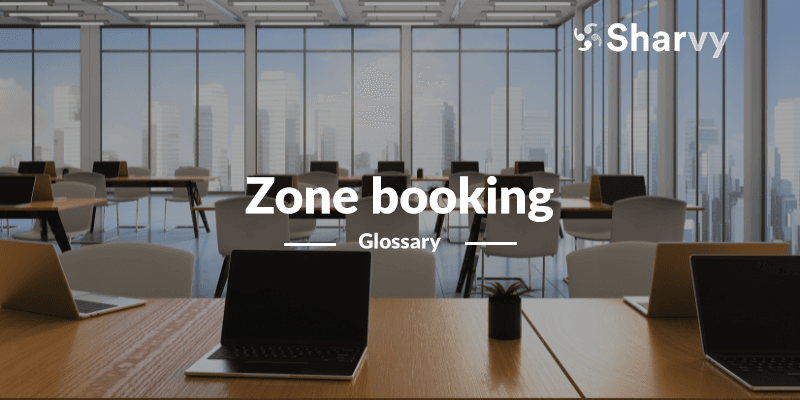What is zone booking within companies?
Is an organisational practice that allows employees to reserve a specific area within a company’s premises, according to their needs and the particularities of their assignments. There is no assigned office. Employees choose a workstation once they are on the premises.
This is usually done using dedicated applications such as Sharvy.
So, unlike reserving an individual workstation, this method is based on the allocation of predefined spaces adapted to the different functions of the company. For example, one area may be dedicated to human resources teams, another to developers, or another to marketing teams.
These areas are designed to meet the specific requirements of each function, by offering the appropriate tools. For example, developers are often looking for workstations with multiple screens to manage several tasks simultaneously, such as reading documentation and writing code.
In this way, zone booking adapts easily to the changing daily needs of employees, ensuring intelligent use of the premises.
What is the difference between desk booking?
Zone booking and desk booking are distinguished mainly by their level of granularity.
1. Zone booking : Reserving a collective space, or a themed area, dedicated to a specific activity or team. In this way, you can distribute your staff intelligently and encourage collaboration between members of the same team.
2. Desk booking : Reserving an individual workstation, often for tasks requiring concentration. It is best suited to working environments where stability and order are priorities.
In short, desk booking focuses on individual needs, while zone booking emphasises the collective dimension and adaptability of spaces. It should be noted, however, that companies can envisage a hybrid solution, combining the two systems to balance flexibility and organisation.
This is entirely possible, thanks to the Sharvy application.
Which sectors benefit most from zone booking?
Is particularly beneficial in sectors where flexibility & collaboration are essential. For example, companies in the technology & digital sector, such as developers & designers, appreciate this practice for alternating between collaborative spaces for creative exchanges & quiet areas for work requiring a high level of concentration.
At the same time, consultancies and professional services, where teams often work on specific projects and assignments, also find zone booking an ideal solution for organising spaces tailored to each need, while optimising premises when staff are frequently on the move.
Finally, large companies and head offices, often made up of multiple departments, can group teams together in spaces adapted to their functions (marketing, HR, finance), while maximising the use of offices for employees working remotely or on the move.
The benefits of zone booking for businesses.
Zone booking has a number of advantages for modern organisations.
Firstly, it allows intelligent allocation of zones within companies, ensuring that each team has an environment adapted to its needs, without under-utilising premises.
At the same time, this organisation offers day-to-day flexibility, allowing spaces to be adjusted according to actual occupancy & fluctuations in headcount, avoiding the need to keep offices unused. In this way, it helps to reduce property costs by optimising space, particularly in hybrid environments where employees come to the office at different times (flex office, hybrid working, etc).
This practice also strengthens collaboration by grouping teams around dedicated areas, encouraging spontaneous exchanges and cohesion.
Finally, zone booking also ensures better management of productivity, as employees choose spaces that correspond precisely to their activities at the time, while offering areas suitable for working in peace or for group meetings.

